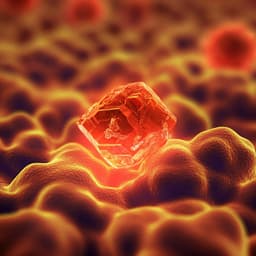
Medicine and Health
The potential role of vitamin D supplementation as a gut microbiota modifier in healthy individuals
P. Singh, A. Rawat, et al.
Discover how vitamin D supplementation can transform gut health! In a groundbreaking study by Parul Singh, Arun Rawat, Mariam Alwakeel, Elham Sharif, and Souhaila Al Khodor, 80 vitamin D-deficient women experienced significant improvements in gut microbial diversity, revealing intriguing links between vitamin D and gut microbiota dynamics.
~3 min • Beginner • English
Introduction
Vitamin D is a lipid-soluble vitamin absorbed in the proximal small intestine and is essential for skeletal integrity, electrolyte homeostasis, and immune regulation. Subclinical deficiency is common (about 40% in the US/Europe and 80–85% in Arab countries) and is associated with diseases including cancer, cardiovascular disease, diabetes, obesity, and inflammatory bowel disease. Inflammatory conditions such as diabetes and IBD show bidirectional interactions between vitamin D and the gut microbiota. While vitamin D may modulate immune homeostasis partly via effects on the gut microbiota, how supplementing otherwise-healthy vitamin D-deficient individuals affects their gut microbiota remains unknown. Additionally, inter-individual variability in serum 25(OH)D response to supplementation is substantial, with about 25% showing little or no increase. Known contributors (dose/kg, supplement type D2 vs D3, age, calcium co-supplementation, baseline 25(OH)D) explain roughly half of this variability, suggesting additional factors such as microbiota may influence responsiveness. This study aimed to characterize gut microbiota composition and diversity before and after vitamin D supplementation in healthy adult females and to determine whether specific microbial signatures associate with differential serum response to supplementation.
Literature Review
Prior studies mainly in disease cohorts report microbiota modulation by vitamin D: in cystic fibrosis, weekly vitamin D3 altered gut and airway microbiota; in multiple sclerosis, vitamin D3 increased Akkermansia, Fecalibacterium, and Coprococcus; in vitamin D-deficient prediabetic individuals, higher 25(OH)D correlated inversely with Firmicutes (Ruminococcus) and Proteobacteria and positively with Bacteroidetes. In overweight/obese adults, higher vitamin D associated with increased Coprococcus and decreased Ruminococcus. Evidence in healthy individuals is limited and mixed: one study noted increased Bacteroidetes and decreased Proteobacteria only in upper GI biopsies, not fecal samples; a small study (n=20) of deficient/insufficient healthy adults showed dose-dependent increases in Bacteroides and Akkermansia, decreased Firmicutes-to-Bacteroidetes ratio, and reduced Fecalibacterium and Ruminococcaceae. There is also recognized high interpersonal variability in serum 25(OH)D responses to supplementation that is only partially explained by known factors, motivating investigation into gut microbiota contributions to response.
Methodology
Design and participants: Prospective intervention study approved by Qatar University and Sidra Medicine IRBs. One hundred healthy female students (March–September 2018) recruited; exclusions included current vitamin D or antibiotic use or chronic disease. Eighty participants completed both pre- and post-supplementation phases and provided paired blood and stool samples.
Intervention: Weekly oral dose of 50,000 IU vitamin D3 (Nivagen Pharmaceuticals, USA) for 12 weeks. Compliance was encouraged via weekly reminders and assessed by pill count at follow-up. Participants were asked to maintain usual diet; intake of dairy and fish recorded.
Classification of response: Responders achieved serum 25(OH)D >20 ng/ml post-supplementation; non-responders remained <20 ng/ml.
Sample collection and assays: Fasting blood (~4 ml) collected pre- and post-supplementation; serum stored at −80°C. Measured calcium, creatinine, BUN, AST, ALT (EasyRA analyzer) and 25(OH)D (DIAsource 25OH Vitamin D Total ELISA, KAP1971/F1).
Stool collection and DNA extraction: 400–500 mg stool collected into OMNIgene GUT kits; DNA extracted using QIAamp Fast DNA Stool Mini Kit; quality assessed by Nanodrop; DNA stored at −20°C.
16S rRNA gene sequencing: V3–V4 regions amplified using Illumina-recommended primers; PCR with Phusion Hot Start Master Mix. Amplicons cleaned and indexed (Nextera XT), quantified (Qubit HS dsDNA), and sequenced (MiSeq v3 kit, 2×300 bp) at Sidra research facility.
Bioinformatics: Quality checks with FastQC; demultiplexed reads processed in QIIME2 (v2019.4). Denoising with DADA2 to generate ASVs/OTUs, chimera removal, trimming to ≥250 bp, mean read length ~411 bp. Taxonomy assigned with Greengenes 13_8 (pre-trained 99% full-length classifier). Rarefaction performed at >10,000 reads; samples with low depth/skewed distribution removed. Final dataset: 9,405,441 paired-end reads from 80 subjects, mean 58,784±31,109 per sample; 7,332 OTUs detected; 12 phyla identified.
Statistical analysis: Data imported to R (R 3.6, RStudio 1.2) and analyzed with phyloseq and vegan. Paired Wilcoxon signed-rank tests with FDR Bonferroni correction (p<0.05 significant). Alpha diversity: Observed OTUs, Chao1, Shannon, Inverse Simpson. Beta diversity: weighted/unweighted UniFrac, Bray-Curtis, Jaccard; ordination via PCA; PERMANOVA (Adonis, 999 permutations). Bacteroidetes/Firmicutes ratio analyzed using linear mixed-effects model for repeated measures (lme4), accounting for subject-specific random effects. Functional prediction: PICRUSt v1.0.0; pathway statistics via STAMP (p<0.05, 99% CI). Differential abundance for responder vs non-responder comparisons with DESeq2 on unrarefied counts (library size normalization in DESeq2).
Key Findings
Cohort and biochemical outcomes: Mean age 21 years; 87.5% Arab; mean BMI 24.39±0.530 kg/m². At baseline, 96% deficient (<20 ng/ml) and 4% insufficient (<30 ng/ml) 25(OH)D. After 12 weeks of 50,000 IU/week vitamin D3: serum 25(OH)D increased from 11.03±0.51 to 34.37±1.47 ng/ml (paired Wilcoxon p=5.1e−14); 89% achieved >20 ng/ml; 69% >30 ng/ml; 11% remained deficient (non-responders). Calcium increased significantly; BUN/Creatinine and AST/ALT ratios decreased, indicating improved kidney and liver function.
Microbiota composition (phylum level): Pre-supplementation mean relative abundances: Firmicutes 55.86%, Bacteroidetes 40.70%, Actinobacteria 2.00%, Proteobacteria 1.15%, Verrucomicrobia 0.21%. Post-supplementation: Firmicutes decreased to 50.57% (p<2.2e−16); Bacteroidetes increased to 43.62% (p=0.001); Bacteroidetes/Firmicutes ratio increased from 0.818±0.048 to 0.954±0.061 (mixed model p=0.0579, borderline). Actinobacteria increased (pre 1.9% vs post 3.1%); Verrucomicrobia increased (pre 0.19% vs post 0.95%).
Genus/species level: Significant increases in Bifidobacterium and Akkermansia (p=0.018). Decreases in Firmicutes genera Roseburia, Ruminococcus, Fecalibacterium. Increases in Bacteroidetes genera Bacteroides, Alistipes, Parabacteroides; decrease in Prevotella. Bacteroides/Prevotella ratio increased (p=0.0057), indicating a shift toward a Bacteroides-dominated enterotype.
Diversity: Alpha diversity increased—Observed OTUs (p=1.6e−05) and Chao1 (p=1.1e−05); Shannon (p=0.71) and Inverse Simpson (p=0.27) not significant. Beta diversity differed by treatment (weighted UniFrac PERMANOVA p=0.048) with higher variance post-supplementation.
Responders vs non-responders: Responders showed significant increases in Bacteroidetes (p=0.012), Actinobacteria (p=0.010), Proteobacteria (p=0.005), Lentisphaeraea (p=0.05) and a marked decrease in Firmicutes (p<2.2e−16). Non-responders exhibited changes notably in Proteobacteria (p=0.02). Responders had a greater increase in Bacteroidetes/Firmicutes ratio than non-responders. DESeq2 identified several species (e.g., Bacteroides acidifaciens, Ruminococcus bromii, Bacteroides eggerthii, Barnesiella intestinihominis) enriched in responders pre- and post-supplementation (padj<0.05). Non-responders showed a significant depletion of Bacteroides acidifaciens post-supplementation (padj<0.05; paired Wilcoxon p<0.01), while responders did not.
Functional predictions (PICRUSt): Post-supplementation increases in predicted pathways for folate biosynthesis; glycine, serine and threonine metabolism; lipid metabolism including fatty acid biosynthesis and unsaturated fatty acid biosynthesis, and metabolism of cofactors and vitamins (Mann–Whitney p<0.05).
Discussion
Findings demonstrate that correcting vitamin D deficiency in otherwise healthy females modulates gut microbiota toward features associated with gut health: decreased Firmicutes with increased Bacteroidetes (lower Firmicutes/Bacteroidetes ratio), increased Verrucomicrobia (Akkermansia muciniphila) and Actinobacteria (Bifidobacterium). Prior work links higher Firmicutes/Bacteroidetes ratio to obesity and metabolic dysregulation, whereas interventions reducing this ratio improve gut permeability and inflammatory markers. The observed increase in Akkermansia and Bifidobacterium aligns with improved mucosal integrity and potential increases in folate and amino acid biosynthetic capacity, supported by functional predictions. Shifts toward a Bacteroides-dominated enterotype and away from Prevotella may be beneficial given associations of Prevotella with IBS and arthritis risk. Mechanistically, vitamin D may act indirectly via host pathways (e.g., vitamin D receptor-mediated regulation of genes involved in intestinal homeostasis, tight junctions, antimicrobial peptides) or directly within the gut lumen if high-dose vitamin D escapes proximal absorption. Functional predictions suggest elevated microbial lipid and fatty acid metabolism that could enhance solubilization and absorption of fat-soluble vitamin D, potentially improving bioavailability. Inter-individual differences in microbiota, particularly baseline and post-supplementation levels of Bacteroides acidifaciens and other taxa, may contribute to variability in serum 25(OH)D responses, indicating the gut microbiota as a factor influencing supplementation efficacy.
Conclusion
Vitamin D3 supplementation (50,000 IU weekly for 12 weeks) in vitamin D-deficient/insufficient but otherwise healthy females significantly increased serum 25(OH)D, improved biochemical markers related to kidney and liver function, and beneficially altered gut microbiota composition and diversity, including increased Bacteroidetes, Akkermansia, and Bifidobacterium and a shift toward a Bacteroides-dominated enterotype. Microbial functional potential for folate, amino acid, and lipid metabolism increased. Microbiota features, notably Bacteroides acidifaciens depletion in non-responders, were associated with differential serum 25(OH)D responses, supporting the concept that gut microbial signatures may predict or influence vitamin D responsiveness. Future research should include randomized placebo-controlled designs with vitamin D-sufficient controls, larger and more diverse cohorts, and multi-omics approaches (genomics, transcriptomics, proteomics, metabolomics) to validate causal links and mechanisms and to advance personalized vitamin D supplementation strategies.
Limitations
Key limitations include absence of a vitamin D-sufficient control group and lack of a placebo arm, which limits control for non-treatment effects. The cohort consisted solely of young adult females, limiting generalizability across sexes and ages. The responder/non-responder subgroup sizes were limited, reducing power for stratified analyses. Functional insights were inferred from 16S rRNA data (PICRUSt) rather than confirmed by metagenomics/metatranscriptomics. Dietary intake was self-reported and only partially controlled.
Related Publications
Explore these studies to deepen your understanding of the subject.







